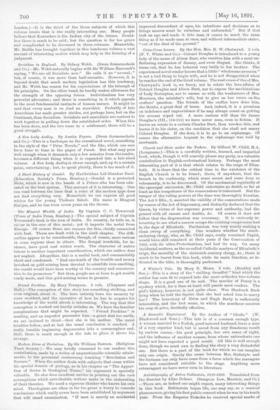Church and State under the Tudors. By Gilbert W. Child,
M.A. (Longman.)—This is a carefully written, learned, and impartial book, which, though it will scarcely please any party, is a valuable contribution to English ecclesiastical history. Perhaps the most interesting part of it is that which relates to the reign of Eliza- beth. It is there that the critical time in the existence of the English Church is to be found ; there, if anywhere, that the breach in its continuity, which some assert and some deny so vehemently, is to be discovered. Of the mechanical regularity of the episcopal succession, Mr. Child entertains no doubt, so far at least as the competence of the consecrators ie concerned. But the temper of the ruling powers at the time was thoroughly Erastian. The Act 8 Eliz., 6, asserted the validity of the consecrations made by reason of the Act of Supremacy, and distinctly declared that the Queen, by virtue of her supreme power and authority, had dis- pensed with all causes and doubts, &c. Of course it does not follow that the dispensation was necessary. It is curiously in- teresting to see what a narrow escape the existing compromise had in the days of Elizabeth. Puritanism was very nearly making a clean sweep of everything. One wonders whether the much- enduring clergy, who, as Mr. Child says, really remained Papist, would have still remained at their posts if the Convocation of 1562, with its ultra-Protestantism, had had its way. On many incidental matters, as the so-called Catholic martyrs of Elizabeth's reign, the morality of the sixteenth•century clergy, Sze., there is much to be learnt from this book, while its main function, as in- dicated in the title, is thoroughly performed.


































 Previous page
Previous page